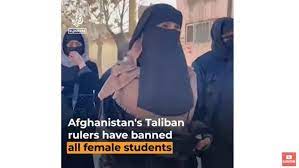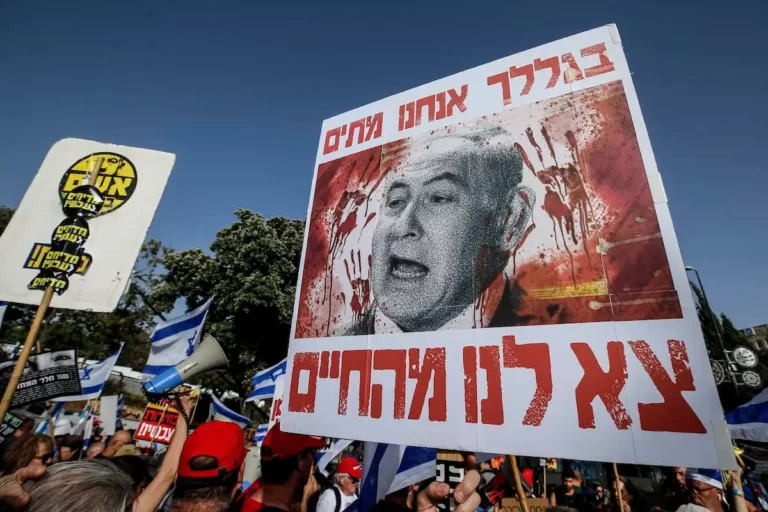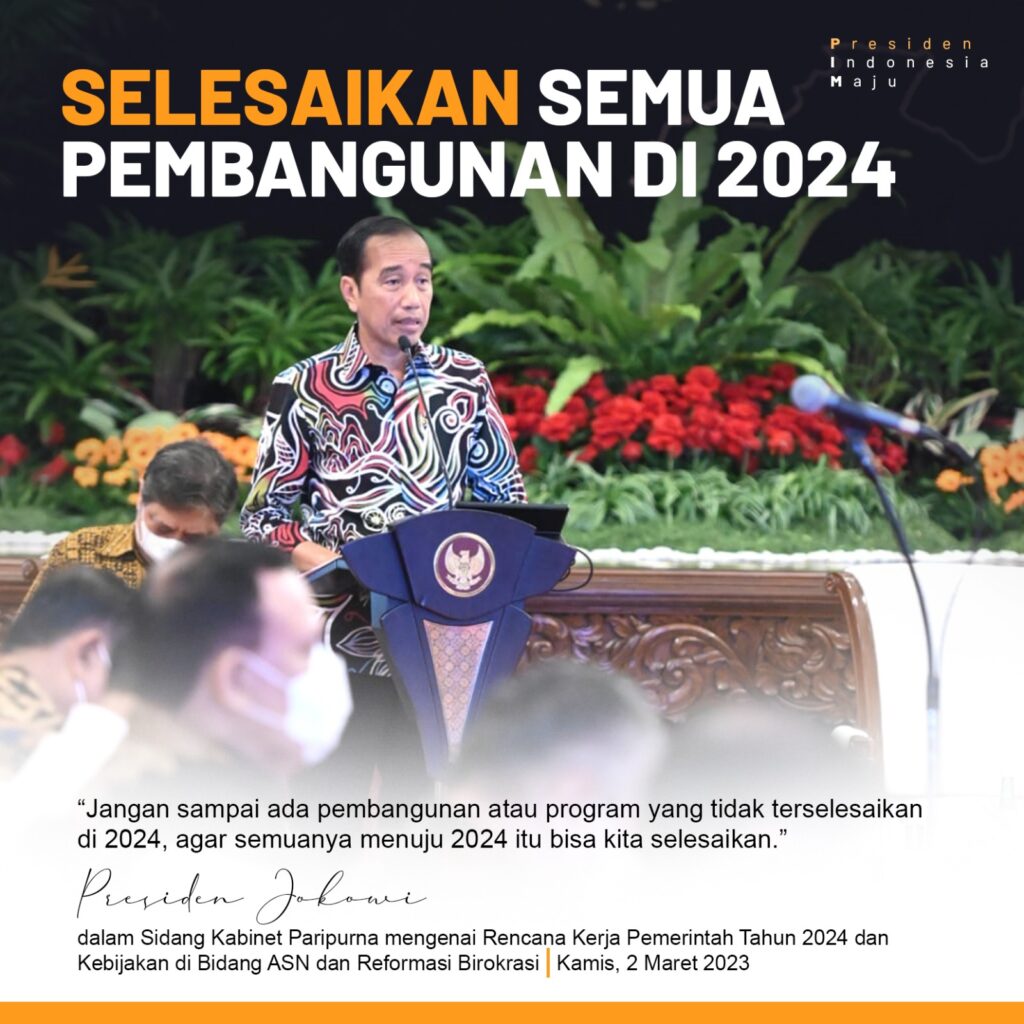
STRATEGIC ASSESSMENT. After being forced to announce her pick for president earlier than expected due to the political fallout from Indonesia’s FIFA Under-20 (U-20) World Cup fiasco, the ruling party matriarch Megawati Soekarnoputri is now faced with another big challenge in choosing the right running mate for Ganjar Pranowo, who is still struggling to reclaim his lead in the polls.
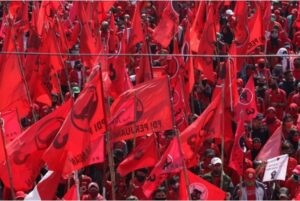
The Indonesian Democratic Party of Struggle (PDI-P) chairwoman has another two months to search carefully for the most suitable running mate for the Central Java governor before announcing her pick in September, only weeks before the registration for presidential and vice presidential candidates opens, the party said.
The Indonesian Democratic Party of Struggle’s (PDIP) Central Executive Board’s (DPP) general secretary Hasto Kristiyanto denied rumors that President Jokowi is supporting Prabowo Subianto in the next year’s election. Jokowi, he said, is “consistent” in carrying Ganjar Pranowo as a presidential candidate in the 2024 presidential election.
Hasto added that as the incumbent, Jokowi is making sure that Indonesia’s future leadership will go well. PDIP’s third national working meeting (Rakernas) has also confirmed its wishes for Ganjar Pranowo to replace Jokowi as President of Indonesia, and the party intends on achieving that goal.
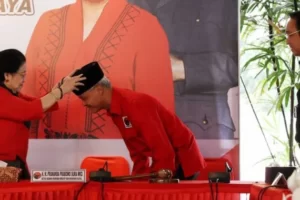
Megawati Soekarnoputri, the chairwoman of the ruling Indonesian Democratic Party of Struggle (PDI-P), will announce presidential nominee Ganjar Pranowo’s running mate in September, a party executive has said. PDI-P secretary-general Hasto Kristiyanto said the party had another two months to search carefully for the most suitable running mate for the Central Java governor.
With people aged 40 and under expected to make up the majority of voters in the 2024 general elections, political parties and presidential hopefuls alike cannot spare any expense in making themselves appealing to a demographic already apathetic about politics, experts have said.
In about three months’ time, registration will open for would-be participants in next year’s grand celebration of democracy, with politicians vying for a place in the legislature and to form the next Indonesian government. The candidates will have to rely on the votes of a burgeoning younger population, according to the finalized national voter roll that the General Elections Commission (KPU) painstakingly verified and announced.
According to Dr Alexander Raymond Arifianto, Senior Fellow Coordinator of Projects, Indonesia Programme, over the past month or so, Prabowo Subianto’s presidential candidacy has been boosted by several recent public opinion surveys indicating that he is leading Indonesia’s presidential race.
For instance, a recent survey by Kompas – Indonesia’s leading newspaper – indicates that the defence minister has the support of 24.5% of likely voters, followed by the other two prospective candidates, respectively Central Java governor Ganjar Pranowo (22.8%) and former Jakarta governor Anies Baswedan (13.6%).
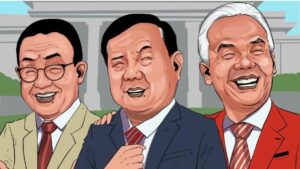
A survey published on 4 June 2023 by Indikator Politik – one of the country’s more reliable survey companies – also puts Prabowo in the lead with 38%, ahead of Ganjar (34%) and Anies (19%). When Prabowo declared his candidacy last year, most analysts considered him the candidate least likely to win the contest due to his age and his two previous failed presidential bids against incumbent president Joko “Jokowi” Widodo in 2014 and 2019. Why then is Prabowo currently leading in the polls? The answer lies in the fact that Prabowo seems to benefit from the strategic miscalculations of both his opponents, who misread the responses from both the political establishment and the general public once their strategies were enacted.
According to Jefferson Ng Jin Chuan and Arya Fernandes. Jefferson Ng Jin Chuan is an Associate Research Fellow at RSIS. Arya Fernandes is the Head of the Department of Politics and Social Change at CSIS Indonesia, there has been an intense flurry of political activity to shortlist and select the most suitable vice-presidential (VP) running mates for Indonesia’s presidential candidates (Ganjar Pranowo, Prabowo Subianto, and Anies Baswedan) in recent weeks. Amidst the political manoeuvring, a pertinent question arises: to what extent do VP candidates matter in Indonesia’s 2024 elections?
Under Indonesia’s election laws, only a political party or a coalition of parties with 20% of parliamentary seats or 25% of the national vote can nominate a joint presidential-vice-presidential ticket. As VPs do not have a clearly defined institutional role, they are often seen as just “spare tires” (ban serep).
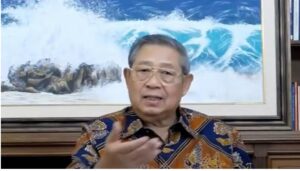
However, based on precedents, strong VP candidates have had demonstrable electoral impact, especially when they possess personal and institutional networks that can be brought to bear. For instance, in the 2004 and 2014 elections, both Susilo Bambang Yudhoyono (SBY) and Joko Widodo (Jokowi) relied on their VP candidate Jusuf Kalla, who owns the well-established Kalla Group based in Sulawesi, to garner votes in the eastern part of Indonesia.
As the political landscape continues to evolve, State-Owned Enterprise Minister Erick Thohir said on Saturday he is ready to contest as a running mate for the 2024 presidential election but added that he’s not in excessive need of attention to become a nominee. Erick also underlined that his potential political career will depend on advice from President Jokowi, who entrusted him with many crucial tasks in the past such as leading the organizing committee for the 2018 Asian Games and the 2019 presidential campaign team, before asking the businessman to join the cabinet.
Gerindra Party politician Andre Rosiade has said his party would welcome new partners this month to back the presidential bid of chairman Prabowo Subianto in the presidential election next year. Gerindra has forged an electoral alliance, called the Great Indonesia Awakening Coalition (KKIR), with a smaller pro-government party the National Awakening Party (PKB), which has been pushing for its own chairman, Muhaimin Iskandar, to be Prabowo’s running mate.

The General Elections Commission (KPU) has declared that 204,807,222 voters, including Indonesians residing abroad, have been registered in the final electoral roll (DPT) for the 2024 general elections. KPU Commissioner Betty Epsilon Idroos, at the national DPT recapitulation meeting on Sunday, noted that the final number comprises 102,218,503 male voters and 102,588,719 female voters. The registered voters spread in 514 districts and cities and 128 countries. According to Betty, 203,056,748 voters will vote in Indonesia, while 1,750,474 Indonesians will vote abroad. With 35,714,901 registered voters, West Java is the province with the highest number of registered voters for the 2024 elections, followed by East Java, with 31,402,838 voters, and Central Java, with 28,289,413 voters.
Indonesia’s influential former leader Susilo Bambang Yudhoyono has criticized the country’s current President Jokowi and his allies for their efforts to determine the outcome of next year’s presidential election. Yudhoyono, an ex-general who is the founder of Indonesia’s Democratic Party, made the criticism in a publication meant only to be shared among the party’s inner circle, but it has since been widely shared online. He warned that while it was acceptable for Jokowi to endorse a candidate, it would be legally wrong to use the state’s resources to help influence the outcome of the presidential race. Yudhoyono’s publication, titled: “The President Can Do No Wrong, 2024 Presidential Election and President Jokowi’s ‘Cawe-Cawe’”, references a Javanese term for meddling, which has been associated with Jokowi’s maneuvers in recent months.

The Golkar Party has reaffirmed its commitment to support chairman Airlangga Hartarto’s bid for the presidency next year following a suggestion from the ruling Indonesian Democratic Party of Struggle (PDI-P) that its presidential nominee, Central Java Governor Ganjar Pranowo, take recent Golkar admittee West Java Governor Ridwan Kamil as his running mate. Golkar would not stray from its intention to nominate Airlangga and would instead intensify it efforts to help him earn a presidential or vice presidential nomination at the negotiation table with other parties, said a senior member of the second-largest party in the House of Representative.
Golkar Party Secretary General Lodewijk F. Paulus on Thursday said the party is still discussing the possibility of a duet between Chair Airlangga Hartarto and the National Mandate Party (PAN) Chair Zulkifli Hasan. However, he has not said certainty regarding the potential for the duet. Previously, Lodewijk emphasized Golkar’s position, saying the party remained in the United Indonesia Coalition (KIB) with the United Development Party (PPP) and PAN. Until now, PAN has been weighing the direction of support for a particular presidential candidate, between Ganjar Pranowo and Prabowo Subianto.
President Joko Widodo appears open to supporting the presidential run of defense minister Prabowo Subianto, despite having openly backed central Java governor Ganjar Pranowo over the past year to be the standard-bearer of his Indonesian Democratic Struggle Party (PDI-P). In the latest of signals that Widodo and his closest advisers are hedging their support for the 2024 race, Widodo sat Prabowo only one seat away from him in a high-profile football friendly with Argentina last week; this was accompanied by rumors that Ganjar did not attend upon learning that he would be seated farther away. Prior to that, Widodo had lunch with Prabowo, which was also widely reported.

A Widodo endorsement would throw the race wide open, at the very least, but it could make Prabowo the early favorite should his numbers hold up. With Prabowo now in a dead heat with Ganjar, Widodo’s support would significantly boost the defense minister’s chances given the president’s popularity.
Former president and founder of the Democratic Party, Susilo Bambang Yudhoyono, has taken a swipe at President Joko “Jokowi” Widodo and his allies and condemned legal threats by political leaders to block an opposition figure from running in the 2024 elections as abuses of power. The 73-year-old talked candidly about his stance regarding Jokowi’s admission of intervening in the selection of a preferred successor in a publication titled The President Can Do No Wrong, 2024 Presidential Election & President Jokowi’s ‘Cawe-Cawe’, released to the party’s inner circle. Having hosted private meetings with political party leaders and appearing to hint at his support for the Indonesian Democratic Party of Struggle’s (PDI-P) presidential nominee Ganjar Pranowo, and then doing the same for Gerindra Party nominee Prabowo Subianto, Jokowi was criticized for maneuvers that his detractors have described as cawe-cawe, a Javanese term for meddling.
President Jokowi has called on Indonesian ambassadors to exert all-out efforts to ensure that the 2024 general elections abroad will run smoothly, Indonesian Ambassador to Romania and Moldova Meidyatama Suryodiningrat. The ambassador also conveyed the president’s message to attach the same level of importance to both the elections conducted abroad and in Indonesia.
Two presumptive presidential candidates Ganjar Pranowo and Anies Baswedan have bumped into each other while on a lunch break during the haj pilgrimage in Saudi Arabia. As the potential rivals took a break from politicking to go on this year’s haj, their respective electoral alliances continue to debate internally who will fill the vice-presidential slots. The meet-up between the two candidates was revealed in a photo that has spread on social media, with the two figures accompanied by their respective families. United Development Party (PPP) politician Suharso Monoarfa, who was also present in the photo, said that the gathering was unplanned.
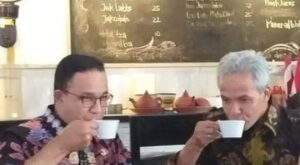
Presidential nominees Anies Baswedan and Ganjar Pranowo met in Mecca while performing the Hajj pilgrimage. The Prosperous Justice Party (PKS) chairman Al Muzammil Yusuf said the meeting presented a good message for the 2024 presidential election. Muzammil opined that the meeting of the two national figures reflected brotherhood despite being in different coalitions. “A brotherhood still exists among the nation’s children,” he told Tempo. The former governor of Jakarta is endorsed by the Coalition for Change and Unity (KPP), while Central Java Governor is supported by the ruling Indonesian Democratic Party of Struggle (PDIP), Hanura Party, Perindo Party, and the United Development Party (PPP).
Defense Minister Prabowo Subianto met with President Jokowi at the State Palace. The meeting is said to be a spontaneous one initiated by the President. Prabowo said that he was asked by the President about his future political plans but refused to respond to questions about his candidacy in the 2024 presidential election. He also disclosed that the brief meeting mentioned geopolitical issues, as he also presented his report on his recent European visit and hinted that the two men are closely observing developments related to the war in Ukraine.
According to Wahyudi Soeriaatmadja, Indonesia Correspondent, Straits Times, signs are growing that President Jokowi is leaning towards endorsing Defense Minister Prabowo Subianto for president in the 2024 polls instead of his own party candidate Ganjar Pranowo, because the chair of right-wing populist Gerindra Party is fully committed to supporting the political careers of Jokowi’s family members, according to analysts. Jokowi, is unlikely to receive such support from his own ruling Indonesian Democratic Party of Struggle (PDI-P) since he is considered a mere party official who has never been promised or offered a high position within PDI-P. A survey in May by Indonesia’s oldest newspaper Kompas revealed that Jokowi’s endorsement could sway voters, with 53 percent of respondents saying they would consider his choice, and 16 percent saying they would vote according to his preference. Political pundits said the political careers of Jokowi’s family members would be safer if he sided with Prabowo, rather than with Ganjar.
According to Yeriea Lai, The Jakarta Post, Former Indonesian Military (TNI) commander Andika Perkasa has joined a list of potential figures to lead the campaign of presidential nominee Ganjar Pranowo, according to the central board chairwoman of the ruling Indonesian Democratic Party of Struggle (PDI-P). Puan Maharani, the PDI-P heir apparent and House of Representatives speaker, confirmed on Thursday that the 58-year-old retired Indonesian Army general was among her potential picks to head Ganjar’s 2024 presidential campaign team. Andika told reporters that he is ready to lead Ganjar’s campaign team. But he refused to speculate, saying that it was better to wait until the PDI-P made a decision.
According to Dio Suhenda, The Jakarta Post, another spat has broken out in the three-way alliance backing opposition figure Anies Baswedan over his running mate in the 2024 presidential election, after the NasDem Party touted Yenny Wahid, the daughter of former president and Islamic scholar Abdurrahman “Gus Dur” Wahid, as one of the most suitable candidates. But the Democratic Party was quick to fire back at the suggestion, as the party wants to see its chair Agus Harimurti Yudhoyono run for vice president alongside the former Jakarta governor. Yenny reportedly has long been on the shortlist for Anies’ running mate, despite her poor electability in opinion polls. But NasDem recently proposed that she should run alongside Anies because of her ties to the nation’s largest Muslim organization, Nahdlatul Ulama (NU), which was founded by her paternal great-grandfather Hasyim Asy’ari.

A recent survey of Central Java residents has found that Surakarta Mayor Gibran Rakabuming Raka, the eldest son of President Jokowi, is emerging as the clear favorite for the province’s gubernatorial race next year, with a double-digit lead over any potential rivals. The Parameter Politik Indonesia survey, conducted from June 2 to 11, found Gibran to have the highest electability among 11 prospective gubernatorial candidates, with 45 percent of respondents from the province saying they would support him. The Surakarta mayor, who is a member of the ruling Indonesian Democratic Party (PDI-P) like his father, outpaced his potential rivals by a lead of more than 40 percentage points. Coming in second was sitting Central Java Deputy Governor Taj Yasin Maimoen, also known as Gus Yasin, of the United Development Party (PPP), with just 5.8 percent.
Deputy Chair of the Indonesian Solidarity Party (PSI) central executive board, Andy Budiman, said that the party is confident in supporting two of President Joko Widodo or Jokowi’s sons in the 2024 elections. The party will endorse Solo Mayor Gibran Rakabuming to become a candidate for Jakarta Governor and his younger brother, Kaesang Pangarep, as a candidate for Depok Mayor in the 2024 elections. Andy said he is not worried about the political dynasty in President’s family if Gibran and Kaesang really lead Jakarta and Depok, respectively. “The dynasty is problematic if it is in a non-democratic closed system,” he said at the PSI office, Menteng, Central Jakarta.
Mayor of Solo, who is also President Joko Widodo or Jokowi’s eldest son Gibran Rakabuming Raka, did not comment too much as he was presented with the details of a survey that positioned himself as the most popular candidate for the Central Java gubernatorial election. Gibran logged a 77 percent popularity in a survey conducted by Parameter Politik Indonesia (PPI). He was surprised as the results were read out to him by journalists at the Solo City Hall.
Acting Minister of Communication and Informatics Mahfud MD has said he expects the Indonesian Broadcasting Commission (KPI) to play an active role in monitoring broadcasting companies to help ensure fair elections in 2024. “As the media regulator, I expect KPI to play its active role in monitoring television and radio broadcasts to ensure the election in 2024 will take place in a direct, general, free, confidential, honest, and fair fashion, and which organizers are free from interventions,” Mahfud said.
Having given his blessing for his younger son to run in local elections, Indonesian President Joko Widodo is making moves to seal his legacy and ensure his power endures even after he steps down from office, analysts said. Mr Kaesang Pangarep, 28, declared on YouTube on Wednesday that he will run in 2024 for mayor of Depok, a satellite city in West Java. He is the latest member of his family to enter politics, after his elder brother Gibran Rakabuming Raka, now Solo mayor, and his brother-in-law and Medan mayor Bobby Nasution.
Joko Widodo, who rose to become Indonesia’s president in 2014 as a political outsider, is positioning himself to become a power broker in the world’s fourth-most populous nation potentially for decades to come. The leader popularly known as Jokowi, 61, will step down next year after serving his second and final presidential term. While speculation had initially swirled that his allies would seek to change the constitution to help him stay on for another five years, the president is now focused on ensuring his influence continues well after he steps down, according to multiple people familiar with the matter.
Indonesia is starting trial runs for its first high-speed train, which will connect the capital Jakarta to a neighboring city of Bandung, after years of delays and cost overruns plagued the project. The railway’s completion would further cement President Joko Widodo’s legacy as a leader who pushed through with major infrastructure projects that have languished for decades. Next, he is aiming to pull off a $34 billion new capital city called Nusantara on Kalimantan island before the end of his second and final term in 2024.
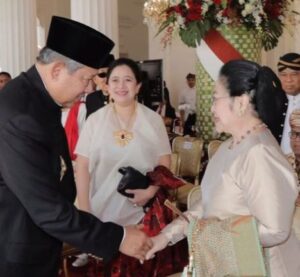
Indonesian Democrat Party for Struggle (PDI-P) chairperson Megawati Sukarnoputri has ended her one-sided, 20-year feud with presidential successor Susilo Bambang Yudhoyono amidst speculation she is intent on killing off opposition candidate Anies Baswedan’s chances of running in the February 2024 presidential election. But following a June 18 meeting at a downtown sports complex between her daughter, parliamentary speaker Puan Maharani, and Democrat Party chairman Agus Harimurti, Yudhoyono’s son, the Democrats said they are sticking with Baswedan’s Coalition of Change.
The Election Supervisory Agency (Bawaslu) chairperson Rahmat Bagja stated that his side has no problem with President Joko Widodo or Jokowi’s intervention in the 2024 election. Bagja said that the matter is difficult to be separated from the president. He also said that Bawaslu will not mind if the President attends political party events. “Regarding intervention, I think all of them will do so if they have a preference about who will continue their work program,” Bagja said before reporters in his office at the Bawaslu building.
The cacophony of polls and political gossip coming out of Indonesia shows we are drawing close to election time in the world’s fourth most populous country and 16th largest economy. Next February’s contest looks set to be a three-horse race, pitting the ruling Indonesian Democratic Party of Struggle (PDI-P) nominee Ganjar Pranowo against veteran Defence Minister Prabowo Subianto and former Jakarta governor Anies Baswedan. Historically, vice presidential picks have had a major influence on whether a presidential bid is successful. The right nominee can appeal to more voters outside of the presidential hopeful’s traditional base and plug gaps in their profile.
President Jokowi and the Gerindra Party’s presumptive presidential nominee, Prabowo Subianto, has fueled speculation that the President is not ready to go all out in backing the Indonesian Democratic Party of Struggle’s (PDI-P) presidential candidate Ganjar Pranowo just yet.
Despite being a member of the PDI-P and having attended numerous rallies for Ganjar, Jokowi, who had openly admitted that he was intervening in the hunt for his successor, has for the past weeks intensified his meetings with Prabowo.
The United Development Party (PPP) officially appointed Sandiaga Uno as a potential running mate for Ganjar Pranowo in the 2024 election. Amid signs of a thawing relationship, Democratic Party chairman Agus Harimurti Yudhoyono finally met with Puan Maharani of the largest ruling party, the Indonesian Democratic Party of Struggle (PDI-P). Despite this reconciliation, analysts believe that the Democrats remain committed to its support for opposition figure and presidential nominee Anies Baswedan.

In response to the statement made by would-be presidential candidate Anies Baswedan regarding the leadership relay, President Jokowi said that the next president should instead continue programs run by the previous leader. Anies said future leadership is not only about continuing the previous government’s programs but also achieving national goals. The state head made an analogy that leadership is not a gas pump meter at a gas station that always starts from zero. He said leadership is a relay race, which is continuous.
Gerindra Party Board of Trustees Deputy Hashim Djojohadikusumo confirmed that the party’s potential presidential candidate Prabowo Subianto would continue President Jokowi’s programs if elected president in the 2024 elections. Golkar Party Chair Airlangga Hartarto lauded the Constitutional Court’s decision to reject the lawsuit against the electoral system, allowing it to remain on the candidate voting system, calling it the right decision and one that takes the community’s aspirations into account.

Indonesia’s constitutional court has struck down a legal challenge to change the country’s electoral system, just eight months before the country’s legislative and presidential elections on February 14 next year. The legal challenge was filed by some six politicians, including Demas Brian Wicaksono who is a member of President Joko “Jokowi” Widodo’s Indonesian Democratic Party of Struggle (PDI-P). The politicians had sought to challenge the General Election Law of 2017 and restore Indonesia’s electoral system to a closed system rather than the current open system. A closed ballot list system means that voters can only choose parties and cannot choose local candidates directly, with the party then deciding the winning candidate internally.
The Indonesian Democratic Party of Struggle (PDI-P) is reaching out to both pro-government and opposition parties in its attempt to create a grand alliance to help its presidential nominee, Ganjar Pranowo, win the election in a single round. PDI-P Chair Megawati Soekamoputri is set to have a closed-door dialogue with the chairs of the pro-government Golkar Party and the National Awakening Party (PKB), after the ruling party’s senior members held preliminary talks with their counterparts in recent weeks, PDI-P Secretary-General Hasto Kristiyanto said.
PDI-P prospective presidential candidate Ganjar Pranowo commented on the issue of political contracts with the party, saying that if elected president in 2024, determining the cabinet would be the president’s prerogative. An Indonesian Solidarity Party (PSI) politician named Ade Armando claimed that Ganjar Pranowo had entered into a political agreement with the PDI-P, which sparked this controversy. One of them is the selection of strategic ministers in the event that Ganjar is elected president in 2024.

The General Elections Commission (KPU) has said that artificial intelligence (AI) technology is beyond its remit in the 2024 election campaign, leaving voters to fend for themselves against a potential deluge of AI-generated misinformation. Eerily realistic deep fakes created using AI technology, which is becoming cheaper and more easily accessible than ever, have become increasingly common on Indonesian social media platforms, with light-hearted content of President Joko “Jokowi” Widodo covering popular songs going on to garner millions of views online.
Indonesia’s Constitutional Court is expected to issue a ruling on a bid to change the country’s voting system, an official said, a case that has sparked concern about a possible delay to an election just eight months away. The case filed by several politicians, including a member of the ruling Democratic Party of Struggle Party (PDI-P) seeks a return of a closed ballot list system that was scrapped in 2008, where voters choose parties instead of local candidates. Of the nine factions in parliament, eight have opposed changing the system, which they say would be regressive and undemocratic. Some legal and political experts have warned the procedures involved in changing the balloting so close to the February 2024 polls would make a delay possible.
In the shadow boxing of Indonesia’s pre-election season, a sounding of support for the “brave, gutsy” Ganjar Pranowo by incumbent President Jokowi has set tongues wagging that the Central Java governor will enjoy heavyweight backing come next year. His remarks last week during a meeting of the Indonesian Democratic Party of Struggle (PDI-P), suggested to many that he has anointed his political heir.
Experts say the polls will pivot on economic conditions, Jokowi’s enduring star power and the ability of the presidential candidates to weave their narrative. Ganjar has the support of the PDI-P’s rank and file, and chairwoman Megawati Sukarnoputri announced him as the party’s presidential candidate on April 21, but he has not yet earned the formal endorsement of its leading light, Widodo.

The Indonesian Democratic Party of Struggle (PDI-P) has extended an unusual peace offering to its archnemesis, the Democratic Party, to potentially partner up for the upcoming general elections, a move that analysts said could put the presidential aspiration of opposition figure Anies Baswedan in tatters. The ruling party unexpectedly opened the door for a potential reconciliation with the opposition party as the long-planned meeting between PDI-P heir apparent Puan Maharani and Democrat Chair Agus Harimurti Yudhoyono (AHY) finally set to go ahead, PDI-P Secretary-General Hasto Kristiyanto said.
After failing to win sufficient political support to get his term extended beyond 2024, President Jokowi is maneuvering to make sure that whoever succeeds him will protect the legacy that he has built since taking power in 2014. Without a political party as his support base, however, he may find limitations to this role as kingmaker.
Ganjar Pranowo’s nomination as the Indonesian Democratic Party of Struggle’s (PDI-P) presidential candidate cannot be separated from the influence of the party’s Chair Megawati Soekarnoputri and President Joko Widodo. Ganjar, the current Central Java Governor, has indeed acknowledged the two leaders’ pivotal roles in his candidacy. But Ganjar still faces many issues after the nomination. His electability plunged following his rejection of the Israel national soccer team in the U-20 World Cup that was initially slated to take place in Indonesia. He is also aware that some of the PDI-P voters who support Puan Maharani, Megawati Soekarnoputri’s daughter, are still reluctant to accept his candidacy.
Political analyst Ray Rangkuti from Jakarta-based think tank Lingkar Madani told CNA that Jokowi’s meddling in the upcoming presidential election is not violating any laws just yet. Rangkuti opined that since there are no official presidential candidates yet, the law cannot be used against Jokowi. “But from an ethical perspective, and from the view to strengthen democracy, it can be said that this meddling is not good,” he said. Rangkuti added that Jokowi should remain impartial.
Coordinating Minister of Political, Legal, and Security Affairs Mahfud MD has asked Indonesians to respond to political differences among each other lightheartedly, instead of with hostility, ahead of the 2024 General Elections. “I understand each of you has your preference. It is fine, but let us face it lightheartedly and not become hostile (with each other). Healthy competition is good, but we should understand each other to avoid any issues,” Mahfud stated.
After outlining an unapproved plan for peace in Ukraine at one of Asia’s foremost defense summits, Defense Minister Prabowo Subianto has come under fire from the ruling PDI-P for appearing to undermine the country’s official foreign policy position, as the minister meets with envoys from Russia and Ukraine. The PDI-P, to which President Jokowi belongs, took a swipe at Prabowo, a frontrunner for the presidency next year, suggesting that its own presidential nominee Ganjar Pranowo would never propose a peace plan incongruent with the country’s diplomatic stance. Secretary-General Hasto Kristiyanto said Indonesia did not need a leader who made suggestions that strayed from the country’s principle of “free and active” diplomacy.
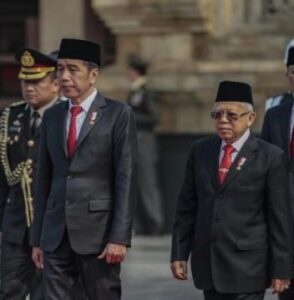
Vice President Ma’ruf Amin has encouraged the young Indonesian diaspora to participate in deciding the nation’s future by voting in the upcoming 2024 General Election. “I encourage our young voters abroad to register, to ensure their participation in the election. Do not abstain, because by doing so you are not participating,” the vice president stated, as per the written statement received here. While visiting Batamindo Green Farm in Batam, Riau Islands, on Wednesday (June 7), Amin said that Indonesian youth residing abroad are an educated group who can better determine the best leaders for the Indonesian nation.




